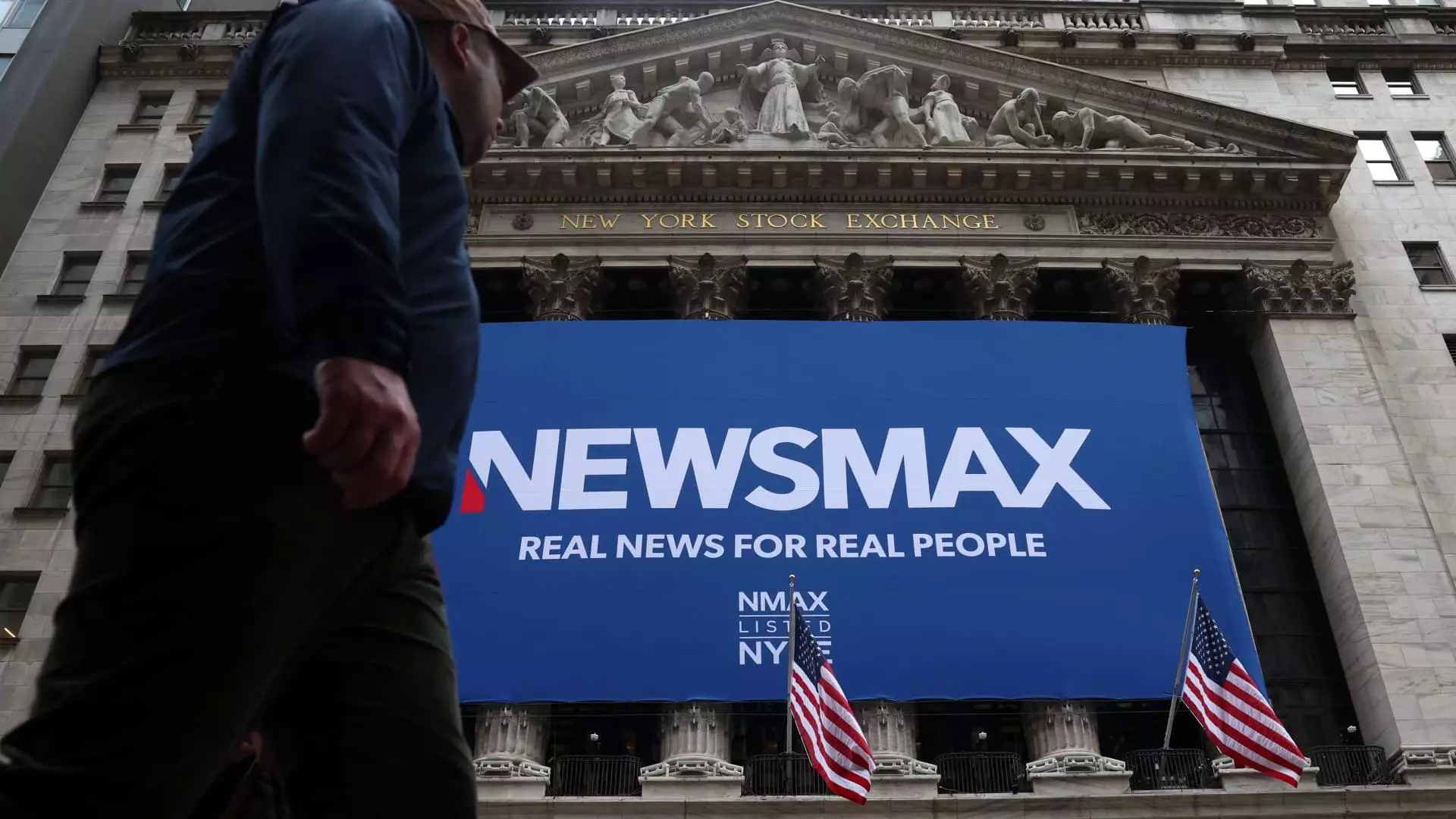The initial public offering (IPO) of Newsmax on the New York Stock Exchange is a significant development in the media landscape, particularly within the conservative domain. As the network made its trading debut under the symbol “NMAX,” shares opened at $14, having initially been priced at $10. By midday, reports indicated that shares had skyrocketed by over 500%, underscoring a palpable fervor among investors keen on promoting a counter-narrative to mainstream media. This frenzy serves as a strong indicator of the growing appetite for conservative media, especially as audiences increasingly gravitate toward channels that resonate with their political beliefs.
The gravity of this IPO can not be overstated, especially in an era when traditional cable television faces decline due to the rise of streaming services. Newsmax’s emergence as the fourth most-watched cable news channel, trailing only behind Fox News, CNN, and MSNBC, brings to light a growing polarization in media consumption. It emphasizes a vital aspect of modern capitalism: the ability to cater to niche markets. As more Americans express discontent with a perceived liberal bias in traditional media, outlets like Newsmax are simultaneously seizing the opportunity to thrive.
Market Realities for Conservative Voices
Christopher Ruddy, the network’s founder and CEO, posits that Fox News has enjoyed a monopoly in the center-right media sphere, suggesting an “opportunity” for competition. This perspective underscores an essential truth about modern media: competition drives innovation and evolution. For too long, conservative voices have been pushed to the fringes of mainstream discussion. The advent of Newsmax signifies that there is a genuine demand for diverse perspectives, including those that may not align with the left-leaning narratives often predominant in other outlets.
Notably, the rise of conservative media is not merely a reflection of audience preference but also an interpretation of the current political milieu. The data supporting Newsmax’s growth suggests that post-Trump America has opened the floodgates—allowing for the proliferation of media entities that prioritize conservative viewpoints. In essence, this IPO represents more than just financial maneuvering; it embodies a cultural shift towards the normalization of right-wing perspectives in a space traditionally dominated by centrist and leftist narratives.
Struggles and Achievements
Despite its burgeoning popularity, Newsmax has encountered its share of hurdles. The company’s financial trajectory was not always smooth sailing, relying initially on advertising revenue before eventually transitioning to licensing fees from cable providers. The setback with DirecTV, which briefly suspended Newsmax from its platform, raises questions about how fragile this new media landscape can be.
Ruddy’s insistence on Newsmax’s “independent news mission” is worth scrutinizing, especially in light of the $40 million settlement the network reached with Smartmatic over unfounded claims of election rigging. In the court of public opinion, the credibility of conservative entities often faces skepticism. Ruddy’s assertions regarding a commitment to conservative principles while maintaining journalistic integrity may be seen as a double-edged sword. Can viewers genuinely trust the narratives presented by a network that has had to navigate such controversial waters?
The Broader Implications for Conservative Media
The IPO of Newsmax signals a potential turning point for conservative media networks in the United States. As audiences adapt their viewing habits and seek out content that aligns with their ideological beliefs, the dynamics of media engagement may fundamentally shift. Moreover, the rise of Newsmax could herald a broader acceptance and commercialization of right-leaning content, prompting other platforms to rethink their programming strategies.
Moreover, Ruddy’s dialogue with Trump indicates the deep interplay between politics and media. Such relationships can prove influential, not only in shaping public perception but also in determining the trajectory of conservative media enterprises. This intertwining raises ethical questions about the integrity of news dissemination in a landscape where political affiliations may muddy editorial lines.
By embracing market forces that resonate with a substantial demographic, Newsmax’s journey thus far reflects not only the changing climate of media consumption but also the reverberating effects of political affiliations on traditional news outlets. While the future remains uncertain, one fact is evident: conservative media is asserting itself more robustly than ever in the fabric of American discourse.

